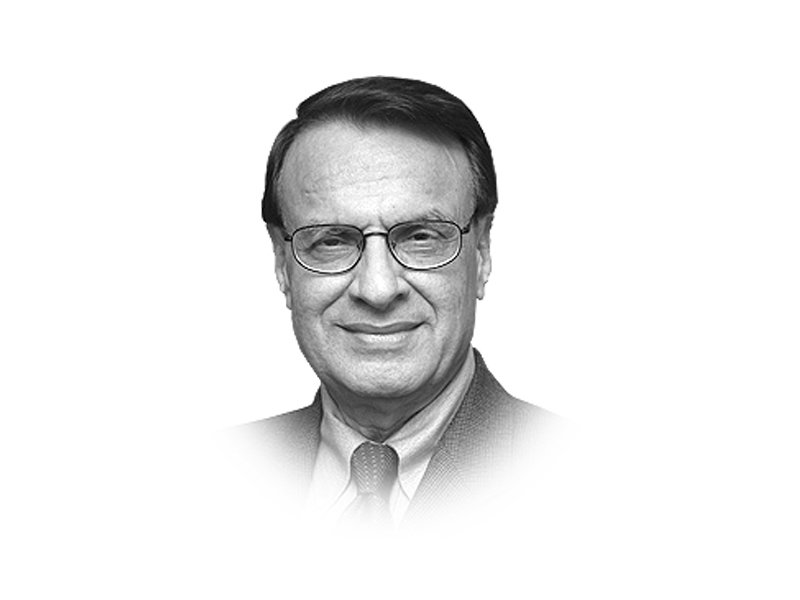

Nations do have defining moments. We have had too many of them. The first in our history was the one that perhaps, most people wouldn’t even know or remember. It was on that fateful day of September 11, 1948 when the Father of the Nation, Quaid-e-Azam Mohammad Ali Jinnah, spent the last hours of his life lying helplessly in an ill-fated ambulance, which broke down due to ‘engine trouble’ at a lonely stretch of the road while bringing him from the Mauripur Air Force Base to Karachi. In her book, My Brother, Fatima Jinnah recalled those agonising moments: “We stood there immobilised … We waited for over one hour, and no hour, in my life has been so long and full of anguish.”
Pakistan’s founder breathed his last in those pathetically agonising moments. Does this painful recollection give us any food for thought or lead us to a feeling of any regret or remorse? The answer lies in the contempt we have been showing to the ideals of democracy, pluralism, social justice and rule of law that our Quaid had envisioned for a dynamic, progressive, moderate and democratic Islamic Pakistan. The passage by the Constituent Assembly of the Objectives Resolution on March 12, 1949 was itself no less than a ‘defining moment’ in our history. But we chose to follow a different path. Intolerance and fanaticism led us to violence with no parallel anywhere in the world.
Within the first year of our independence that happened to be the last of his life, the Quaid had presciently foreseen the coming events. He was disillusioned with the scarcity of calibre and character in the country’s elitist feudal and tribal political hierarchy, which was to manage the newly-independent Pakistan. The Quaid’s worries were not unwarranted. After Liaquat Ali Khan’s assassination in 1951, political ineptitude loomed large on the country’s horizon. A governmental decision in 1952 of making Urdu the sole national language was also a ‘defining moment’. It became the nation’s first bete noire.
In 1954, we had our history’s first, albeit civilian coup d’etat. In his viceregal tradition, former governor general Ghulam Muhammad dissolved Pakistan’s first Constituent Assembly, a step later upheld by the then Supreme Court as valid. This, too, was a ‘defining moment’ and the beginning of our ‘democratic’ disorder. It took our politicians nine years to frame our first constitution in 1956, which was abrogated in less than three years. Since then, we have had two constitutions, one promulgated by a field marshal president in 1962, and the other adopted in 1973 by an ‘elected’ group of people, who had no mandate to do so. They were, in fact, responsible for the country’s break-up.
The reasons that precipitated the 1971 tragedy remain unaddressed in the 1973 Constitution, which was adopted under pressures emanating in the aftermath of the break-up tragedy rather than on the merits of the document itself. No government has ever attempted to correct the systemic anachronisms in our federal structure or to redress provincial grievances. Meanwhile, defining moments kept happening one after another in our chequered history. Bhutto’s rule itself was a defining moment. He had the opportunity to recreate the Quaid’s Pakistan. But he chose to become a ‘Quaid’ himself. Besides, seeking to make Pakistan a one-party state, Bhutto pursued a populist agenda, nationalising the country’s banks, schools, colleges and major industries. The nation is still paying the cost of his socialist perversity. Bhutto held early elections to become more powerful but with its controversial results, he soon found himself out of power. General Ziaul Haq’s military takeover in July 1977 was another painful ‘defining moment’ in our history, with its ghosts still haunting our benighted land. In October 1999, General Pervez Musharraf’s military takeover represented our next critical ‘defining moment’.
In the blink of an eye, we dragged into our tribal areas a war that did not belong to us.
The US has wrapped up its war in Afghanistan but we are still fighting a war without realising that terrorism is a disease that will not end with military operations alone. It has to be treated through socioeconomic policies and good governance. No wonder the Peshawar tragedy came as a thunderbolt for the government. This was a wake-up call. An exceptional challenge warranted an exceptional response. Instead of proclaiming a selective emergency as provided in the Constitution’s Article 232, the government opted for a cosmetic, extra-constitutional remedy. It convened an APC to approve a 20-point plan of action. Parliament stood bypassed. It was used only for rubberstamping the plan, which is nothing but an annotated list of normal governmental functions that successive governments had failed to perform. The 21st Amendment is recognition of cumulative governance failures. Even if military courts become functional, what about the remaining 19 points? Who will implement them? If angels do not descend to do that, will the armed forces be requested to undertake that responsibility as well? Will the government even remain relevant anymore?
Ostensibly, there seems to be total strategic bankruptcy in our political cadres. But what if their ‘plan of action’ is itself part of a plan to overstretch the armed forces through excessive use of Article 245 in order to exhaust and weaken them as their sole nemesis, which over the decades has emerged as the only cohesive force in the country? Politicians have already reduced the judiciary and legislature into non-consequential entities and made the police and bureaucracy subservient to their own vested interests rather than the public good. How they led the armed forces into the 1971 debacle is known history. Instead of repeating it, let the armed forces remain the armed forces so that they can defend the country against external and internal threats. Perhaps, it’s time we looked beyond ‘defining moments’.
Published in The Express Tribune, January 17th, 2015.
Like Opinion & Editorial on Facebook, follow @ETOpEd on Twitter to receive all updates on all our daily pieces.
COMMENTS (17)
Comments are moderated and generally will be posted if they are on-topic and not abusive.
For more information, please see our Comments FAQ



1731655243-0/BeFunky-collage-(61)1731655243-0-165x106.webp)








Let us be realistic, Around 1946 Mr Jinah undoubtedly discussed the future with some junior colleagues and requested that they produce a non-working blueprint for future Pakistan, and the blueprint has been enshrined in some hidden spot so that as new leaders come along they can read it and follow it to the letter. Undoubtedly many of Pakistan's security problems have been created and aggravated by the US, but did Pakistan have to cooperate so enthusiastically?.
A golden sentence here : ---" The US has wrapped up its war in Afghanistan but we are still fighting a war without realising that terrorism is a disease that will not end with military operations alone. It has to be treated through socioeconomic policies and good governance----"
May we have a list of some suitable socio-economic policies.
How about chocking the finances of terror groups ?
I will also add two more defining movements 1. indus water treaty, unfortunately called acceptance of LOC by modern day columnists in Pakistan. Even today India is agree to supply power at manafacturing cost to POk. 2. Failure of Nehru to develop India defence by relying on failed politicians. leading to occupancy of parts of kashmir by China.
i ask pakistani readers their views on 1962 indian defeat by China feeling in Pakistan that india was defeated, we can capture Kashmir. thus giving way to 1965, loss of land in Aksai Chin to China by India. Transfer of land in pakistan Kashmir to china by Pakistan, as insurance. are these is not defining movement/s.
As usual excellent! Hats off, but who among the govt stalwarts reads or go through these excellent articles? Whole lot consists of fake degree holder with lust of wealth and protocols.
Mr. Secretary Sir, I agree with the contents and the quest of your article and appreciate your candidness.. However some very important developments have been set aside, perhaps for parsimonious purposes. One was dismemberment of PK assembly in 1948 and installing a hand-picked government in the province by no other than the Quid himself. Second was Ayub's infamous memorandum of 1953, which set the tone for abolishing the Constituent Assembly and establishing Governor General's rule at the center. Also please do not forget the role of one of your senior (Aziz Ahmed) who as Chief Secretary of E. Bengal played a major role in the language riots of the province and smoothened the way to dissolve its assembly, ultimately leading to its separation. The gentleman, as you know, later became the civilian Deputy Martial Law Administrator in 1958 and then allied with another co-conspirator named ZAB to give a bad name to the signatories of Tashkent Pact (both Ayub and Shastri), only to become foreign minister. The list is too long of the so-called well wishers of Pakistan and include the names of Maudoodi, Daultana, Mushtaq Gourmani, Sahbzada Yaqoob, and not to mention butcher of Dhaka from Gujar Khan, Rawalpindi. Some just make it too far. Regret to say but the events or historical moments were shaped by their vested interests.
In stable countries, armed forces are armed but not a forces in the political arena. Pakistan's armed forces have succeeded in creating an image as a saviour of their country even though they have managed to lose half of it and have messed up the remaining part. @Askari, Have the armed forces remained intact? If they did, Pakistan would not be where it is. Political Islamisation of the armed forces took place during Zia's rule and has changed the societal landscape of Pakistan.
A tip of the hat to you, Shamshad Sahib, for this brilliant article. I write these brief comments on the off chance that they may make it past the ET editors. Recently, my attrition rate has been high.
There is one great service that persons like yourself may do the Nation, and that is to pen your recollections of events past and save them for young of this land. They will learn to reason for themselves only when factual accounts are made available. From such accounts, the unvarnished truth will emerge.
Of the many points that you have made, I feel three are exceptional.
First, Mr. Jinnah realising very late that he was surrounded by persons of less than exceptional ability. Who was responsible for this other than Mr. Jinnah himself, as he had ample time to select the real gemstones from within Muslim India. He could not withstand any signs of original thinking in his associates. One is hard pressed to name any intellectuals amongst the Pakistani vanguard. The tradition continues unabated.
Second, that the assembly in 1973 who formulated the Constitution of Pakistan were directly responsible for the dismemberment of Pakistan. They did so with the deliberate ease of switching a light-bulb off. The resulting document is now considered sacrosanct by all and sundry.
Third, the sudden leap upwards executed by Musharraf on a mild scolding from the USA, from which we have still not managed to come down. People living in that area for centuries have been pulverised by our bombardment. In return our leaders, in and out of uniform, have been able to exact little of significance from the USA that could have benefited the masses.
@John B: You think you can keep the diatribe short? Like 5 pages only?
@Prakash: But a vigilant hindu troll still jumped in.
Finally happy to see someone write a complete article on Pakistan without even once blaming India!
It is not that there are too many defining moments. Rather, too many defying moments: defying the very idea of a nation, of history, of strong and ancient cultural heritages in different parts, of the idea of civic society, of tolerance and lastly, self respect.
Shamshad Sahib, Well said. We do not seem to learn from history at all. We have destroyed our precious assets, bureaucracy, judiciary and police. My generation has failed the nation. The Military is the only asset intact to some extent. Let us back it. Most young people who harbor what may be genuine grudge against the Military forget that without total support of the people the Military is as impotent as it proved to be in erstwhile East Pakistan.Let us support it and keep it.
What if the 21st amendment itself is the strategy of armed forces to extend its reach in PAK governance instead of the typical coupe which the army cannot do anymore. No PAK amendment that affects the army can be passed without the approval of the military. If that is so, civilian leadership could have done wonders, despite their shortcomings.
The article spins the fact to fit its narrative as if the 21st amendment was imposition on military by the civilian authorities and the military is an innocent victim that has to grudgingly adhere to the wishes of the amendment. On the contrary, the amendment is the key for the military to over reach their role in PAK affairs which are declining due to the geopolitical environment. After all, as the author himself asks, "who is going to implement it"; Civilian of course, but under whose dictate ?
No one is expecting that amendment will die in two years and terrorism will be eliminated by hanging everyone in military court proceedings. The amendment essentially muzzled the relatively independent judiciary and brought the political parties to the reality who is in control of PAK.
This is PAK's defining moment on how political parties sacrificed their rudimentary parliamentary exercise to stay in power to claim democratic success in PAK. We will revisit this, when the amendment is about to expire.
Defining movements of Pakistan in my opinion are formation of Pakistan movement, 14 August 1947, death of Jinnah, 1958 Islamabad, 1962 indiAn defeat by China, 1964 incursion to sir creek by pakistan, 1965 operation Gibraltar, September 6 pakistan day, 1971 bangladesh, 1977 zulfikar hanging, 1977- 1988 Zia ul haq, Hudood, 1999 kargil. Atomic blast in chagai, confessions of AQ Khan. So on
Please forgive me if I am wrong but is it an open invitation for martial law. In normal countries armed forces are armed forces defending external threat. Armed forces do not run foreign policies by applying every techniques in their armery to undermining civilian governments. Armed Forces do not fight for grabbing greater share of resources in foreign aid for example famous Kerry Lugar Bill. The results of a billion $ spend on reforming Madrassas will be for more greater than buying toys like chinese fighter planes. Investing in training & resourcing Police & FC to avert massacre like APS. It is not fair to blame politicians for the failure of army to behave like an army.